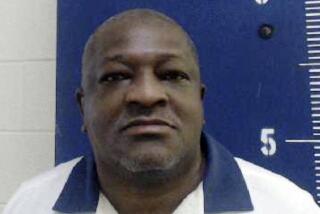Troy Davis’ death shines light on Rick Perry’s execution record
Something extraordinary occurred Wednesday night as death row inmate Troy Davis awaited word on whether his execution at the hands of the state of the Georgia would go forward.
The merits of Davis’ case, as well as capital punishment, were debated on Twitter around the world in real time as the U.S. Supreme Court took up Davis’ plea for a stay and the clock ticked. Some arguments were moral. Some were based on evidence. And some were based on theories of governing. (Is putting a man to death the ultimate in “big government?” Is it an example of states’ rights? Can you be in favor of abortion rights and oppose the death penalty? Vice versa?)
The arguments raged, even as news broke that the high court had denied Davis’ petition and even as, finally, word came that Davis had been executed, a few minutes after 11 pm EDT.
To those following along on Twitter, Davis was alive and fighting for his life one minute and the next he was gone, maintaining his innocence to the very end. Those who passionately argued against Davis’ execution were shocked, crestfallen and shattered. Many viewed it as a defining moment in America’s tortuous history with capital punishment.
Whether that’s true remains to be seen, but the question has relevance now that campaign season is in full swing. And the ultimate sanction’s popularity with a wide swath of the American electorate should not be underestimated. Earlier this month, at the Reagan Library debate in California, the audience cheered as moderator Brian Williams noted that Rick Perry had presided over 234 executions as Texas governor. Williams was taken aback.
Perry was asked whether he ever worried that the state had executed an innocent man. “I’ve never struggled with that at all. The state of Texas has a very thoughtful, a very clear process in place of which — when someone commits the most heinous of crimes against our citizens, they get a fair hearing, they go through an appellate process, they go up to the Supreme Court of the United States, if that’s required,” he said.
The crowd applauded. Williams asked Perry what he made of the crowd’s reaction.
“I think Americans understand justice,” he said. “I think Americans are clearly, in the vast majority of — of cases, supportive of capital punishment.”
The governor is right on that score. Polls consistently show that a majority of Americans support the death penalty, although the number has steadily declined. And while Perry has taken his hits on the issue, Democrats Bill Clinton and Barack Obama have also supported the sanction. (Obama, it should be noted, did not involve himself in the Davis case nor did the more liberal members of the court dissent from the decision to deny Davis’ petition. The vote was 9-0.)
While Obama was running for president, he said he disagreed with a controversial Supreme Court decision that held that the death penalty was unconstitutional in cases where a child was raped, but not killed.
“I have said repeatedly that I think that the death penalty should be applied in very narrow circumstances, for the most egregious of crimes,” Obama said in 2008. “I think that the rape of a small child, 6 or 8 years old, is a heinous crime, and if a state makes a decision that under narrow, limited, well-defined circumstances, the death penalty is at least potentially applicable, that that does not violate our Constitution.”
Unlike Obama, Clinton served as governor of a state that carried out executions. In January 1992, in the heat of the presidential campaign, Clinton flew home to Arkansas to oversee the execution of Ricky Ray Rector, who had killed a police officer before shooting himself in the head. The shot made Rector mentally impaired, but the execution went forward as scheduled. A decade later, the Supreme Court would rule that executing the mentally retarded is unconstitutional.
Clinton became more comfortable with the death penalty during his time as governor—and if he had national ambitions, there was reason to do so. At the time, Michael Dukakis’ response during a presidential debate in 1988 about whether he would support the execution of a man who had raped and murdered his wife had drawn national derision.
George W. Bush presided over 152 executions while governor of Texas, including the death by lethal injection of Karla Faye Tucker, the first woman to be put to death in the state in over a century. Tucker’s conversion to Christianity while in prison resulted in an unusually large outcry over her sentence, but Bush was unpersuaded. Advocates also believe that a man executed under Bush’s watch in Texas, Claude Jones, may have been innocent.
Twice this month, the Supreme Court has taken the unusual step of staying a scheduled execution in Texas after Perry and other Texas officials declined to intervene. In Duane Buck’s case, jurors were told at trial that Buck posed a greater danger to public safety because he is black. Cleve Foster, the second inmate, has maintained he is innocent of the rape and murder of a woman in 2002.
As the GOP front-runner, Perry’s record on executions is being closely scrutinized. The most controversial case involves Cameron Todd Willingham, who was convicted of starting a house fire that killed his three daughters. Willingham was executed in 2004, but several publications, including the New Yorker and the Texas Tribune, have raised questions about his culpability.
The Tribune has examined several other cases during Perry’s tenure that it argues should be reviewed “because of continuing concerns about the ability of prisoners facing capital charges in Texas to retain quality legal representation, the execution of those who were minors when they committed their crimes, the ability of some prisoners to intellectually understand their punishment and the international ramifications of executing foreign nationals.”
But if Perry does have some troubling marks on his record, will that matter to the Republican base—or to the voting public at large? The question may be revisited at Thursday night’s GOP debate in Orlando, Fla. But if the crowd there is similar to that at the Reagan Library, there won’t be much doubt about the answer.
Here’s that scene from the Reagan Library: Here is a clip of the Dukakis response in 1988:
More to Read
Get the L.A. Times Politics newsletter
Deeply reported insights into legislation, politics and policy from Sacramento, Washington and beyond. In your inbox three times per week.
You may occasionally receive promotional content from the Los Angeles Times.






